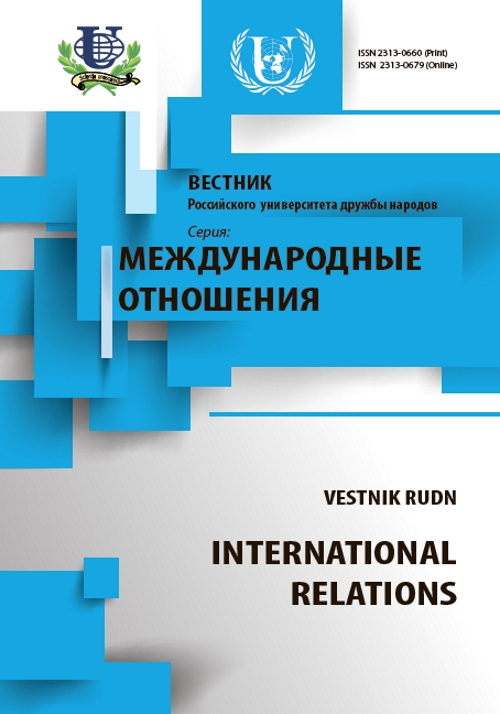Armenian Studies of the French Think-tanks and the Decision-making process
- 作者: Khachaturyan D.A.1
-
隶属关系:
- Peoples’ Friendship University of Russia
- 期: 卷 16, 编号 1 (2016): "Soft Power" in International Relations. The Image of Russia
- 页面: 124-132
- 栏目: ARTICLES
- URL: https://journals.rudn.ru/international-relations/article/view/10534
- ID: 10534
如何引用文章
全文:
详细
This article is devoted to the research of the Armenian issues in research activity of Franch think tanks. The article analyzes the interrelation between Armenian studies in the main foreign policy and international affairs think tanks in France and the decision-making process, and also the Armenian diaspora's influence on this process. The main part of researchers and experts dealing with the Armenian themes in the think tanks of France, is of Armenian descent, and first of all they are interested in the political issues of the country of their origin. Think tanks have different methods of bringing their intellectual product to the decision-makers. Think tanks can influence decision-makers through the public opinion, disseminating the results of their research and ideas through the media or through the publication of political journals. Speech of the researchers as experts during hearing in the Parliament is also one of the methods for an influence on politics. In the article particular attention is given to the quantitative analysis of the impact of the researchers and think tanks on the political process.
作者简介
David Khachaturyan
Peoples’ Friendship University of Russia
编辑信件的主要联系方式.
Email: da9653076309@gmail.com
Department of Theory and History of International Relations
参考
- Istomin I.A. Mekhanizm nauchno-analiticheskogo obespecheniya vneshnepoliticheskogo protsessa v SShA [The science-policy mechanism of securing the foreign policy process in the United States.] Vestnik MGIMO (U) MID Rossii, 2009, no. 6, pp. 97-110.
- Mirzayan G.V. «Mozgovye tsentry» i protsess prinyatiya reshenii v SShA [«Think tanks» and the decision-making process in the United States.] Elektronnyi nauchnyi zhurnal Rossiya i Amerika v XXI v., no. 3, 2011.
- Billion D. Vers une réconciliation turco-arménienne ?. IRIS - Observatoire de la Turquie et de son environnement géopolitique, 28 avril 2014.
- Cheterian V. Histoire, mémoire et relations internationales: la diaspora arménienne et les relations arméno-turques. Relations internationales. 2010, no. 141, pp. 25-45.
- Dumont G-F. Haut-Karabagh: Géopolitique d’un conflit sans fin. Géostratégiques, 2013, no. 38, pp. 35-74.
- Ekovich S. La géosociologie de la diaspora arménienne. Géostratégiques, 2006, no. 12, pp. 193-210.
- Fieschi C., Gaffney J. French Think Tank in Comparative Perspective, in D. Stone e A. Denham, Think Tank Across Nations: A Comparative Approach, Manchester, Manchester University Press, 2004, pp. 42-58.
- Govciyan A. L'intégration réussie des Arméniens. Revue internationale et stratégique. 2009, no. 73, pp. 87-89.
- Gregorian A. L'Union et le conflit du Karabakh, in Le Sud Caucase: un défi pour l'UE, sous la direction de Dov Lynch, Cahiers de Chaillot, 2003, no. 65, pp. 131-144.
- Kazancigil A. La Turquie face au génocide des Arméniens: de la négation à la reconnaissance?. Politique étrangère, 2015/3 (Automne), pp. 73-81.
- La question arménienne, préoccupation française et défi turc. Club du Millénaire. IRIS - Observatoire de la Turquie et de son environnement stratégique, juillet 2013.
- Marian M. Génocide arménien : retour sur un centenaire. Politique étrangère, 2015/3 (Automne), pp. 83-91.
- Marian M., Makarian Ch. Les Arméniens de France et la Turquie: la possibilité d'un dialogue?. Note franco-turque no. 5, IFRI Programme Turquie Contemporaine, Janvier 2011.
- McGann James. 2015 Global Go To Think Tank Index Report, University of Pennsylvania, 2-9-2016. Available at: http://repository.upenn.edu/think_tanks/10/ (Accessed 18.03.2016)
- Minassian G. Le dialogue arméno-turc. Revue internationale et stratégique, 2009, no. 75, pp. 47-58.
- Minassian G. L’Arménie, avant-poste russe au Caucase ?. Russie.Nei.Visions, no. 27, février 2008.
- Minassian G. Grands manoeuvres dans le Caucase du Sud. Politique Etrangère, 2008/4 (Hiver), pp. 775-787.
- Minassian G. Paix et sécurité dans le Caucase du Sud. Politique Etrangère, 2004/4 (Hiver).
- Minassian G. Caucase du Sud, les enjeux de la coopération régionale. Politique Etrangère, 2002/3 (Automne).
- Monange B.F. Social Science Expertise and Policymaking. Comparing U.S., French, and EU Think Tanks: Similar Model Different Paths. PS: Political Science & Politics, 2008, Vol. 41, Iss. 4, p. 909.
- Petithomme M. L'État de facto du Haut-Karabagh arménien: entre démocratisation en trompe-l'œil et ethnicisation. Revue internationale et stratégique, 2013, no. 89, pp. 30-39.
- Popescu N. Behind – and beyond – Armenia’s choice. ISSUE Alert, no. 35, 18 octobre 2013.
- Popescu N. Keeping the Eastern Partnership on track. ISSUE Alert, no. 29, 06 septembre 2013.
- Yegavian T. Repères minorités: Les relations entre les chrétiens et le régime Al-Assad. Moyen-Orient, no. 12, Octobre-Décembre 2011.
- Yegavian T. Turquie : une société qui s’interroge sur elle-même et son histoire. Moyen-Orient, no. 9, Janvier-Mars 2011.
- Williams A. Why don’t the French do think tank?: France faces up to the Anglo-Saxon superpowers, 1918–1921. Review of International Studies, 2008, pp. 53-68.
- Zarifian J. Les États-Unis, la Turquie et le "problème" arménien. Hérodote, 2013, no. 149, pp. 53-65.
- Zarifian J. La politique étrangère américaine en Arménie: naviguer à vue dans les eaux russes et s'affirmer dans une région stratégique. Hérodote, 2008, no. 129, pp. 109-122.
- Zarifian J. La politique étrangère américaine, en dehors des sentiers battus. Les États-Unis au Sud Caucase (Arménie, Azerbaïdjan, Géorgie), de Bill Clinton à Barack Obama. Politique américaine, 2012, no. 19, pp. 68-92.
- Zarifian J. Julien Zarifian. Géopolitique de l’Arménie; Interview. Diplomatie, no. 11, Octobre 2012, pp. 58-61.
补充文件








